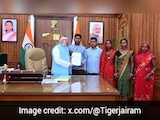Thiruvananthapuram:
On the occasion of "World Indigenous Day" today, Kerala government has set up a cabinet panel to look into the woes of unwed tribal mothers in the state, a minister said.
In view of recent media reports about the plight of unwed tribal mothers, some of them teenagers, the government has set up a cabinet panel comprising Home Minister Thiruvanchoor Radhakrishnan, Tourism Minister AP Anil Kumar and Minister for Scheduled Tribes and Youth Affairs, PK Jayalekshmi.
Various actions taken for the rehabilitation of unwed mothers would be evaluated by the committee and a report on the issue would be submitted this month itself, Jayalekshmi said on the occasion of "World indigenous Day" today.
As per data, there are 935 unwed tribal mothers in various settlements in the state.
"A collective effort at various levels of administration is essential to achieve the goals set by United Nations which declared 2005-15 as 'decade of indigenous'," the minister said in a release here.
The Congress-led UDF Government in the state has also set up a ministerial sub-committee to address the problem among the tribal population in Wayanad district, an upland area which has the largest number of adivasi population in the state.
Jayalekshmi, the lone minister belonging to a tribal community from Wayanad, appealed the media to give due prominence to the problems of the adivasi population.
She said this was especially important since the theme of this year's World Indigenous Day is "Indigenous media, empowering indigenous voices."
Seeking to make tribals self-sufficient, the government has also begun preliminary works for construction of model tribal colonies which comprises houses, dairy farms, vegetable plantations, biogas plants and common facility centre.
Kerala's total tribal population stood at 4,26,208, belonging to 38 different communities and a majority of them live in various tribal settlements.
In view of recent media reports about the plight of unwed tribal mothers, some of them teenagers, the government has set up a cabinet panel comprising Home Minister Thiruvanchoor Radhakrishnan, Tourism Minister AP Anil Kumar and Minister for Scheduled Tribes and Youth Affairs, PK Jayalekshmi.
Various actions taken for the rehabilitation of unwed mothers would be evaluated by the committee and a report on the issue would be submitted this month itself, Jayalekshmi said on the occasion of "World indigenous Day" today.
As per data, there are 935 unwed tribal mothers in various settlements in the state.
"A collective effort at various levels of administration is essential to achieve the goals set by United Nations which declared 2005-15 as 'decade of indigenous'," the minister said in a release here.
The Congress-led UDF Government in the state has also set up a ministerial sub-committee to address the problem among the tribal population in Wayanad district, an upland area which has the largest number of adivasi population in the state.
Jayalekshmi, the lone minister belonging to a tribal community from Wayanad, appealed the media to give due prominence to the problems of the adivasi population.
She said this was especially important since the theme of this year's World Indigenous Day is "Indigenous media, empowering indigenous voices."
Seeking to make tribals self-sufficient, the government has also begun preliminary works for construction of model tribal colonies which comprises houses, dairy farms, vegetable plantations, biogas plants and common facility centre.
Kerala's total tribal population stood at 4,26,208, belonging to 38 different communities and a majority of them live in various tribal settlements.















